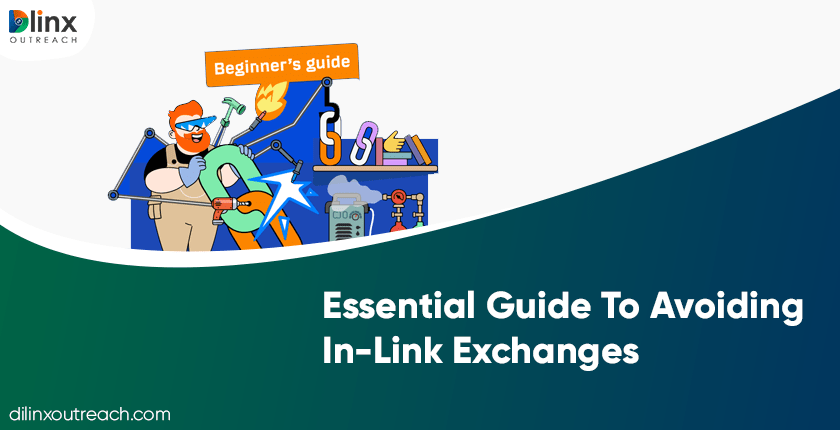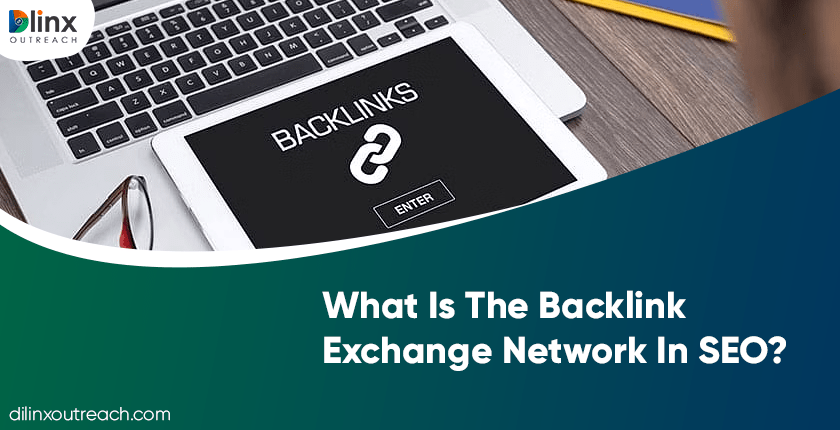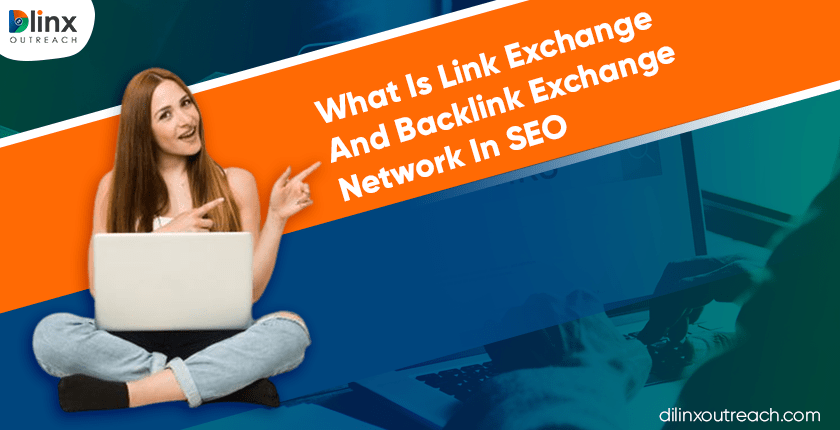You’ve probably heard of link exchange and backlink exchange networks if you want to boost your website’s search engine rankings. These techniques involve building a web of connections between your site and others.
Think of it like a spider web, with your place at the centre and others linking to you like spokes. With link exchange, you can connect with other sites in your niche and drive traffic to your page.
A Backlink exchange network takes things a step further, creating a web of high-quality backlinks that can help your site climb the search engine rankings.
But be careful not to get tangled up in a web of spammy links. Always use these techniques wisely, and you’ll see the benefits in no time.
Keep reading if you’re eager to learn more about link exchange and backlink networks.
Read | How To Do Blogger Outreach For Beginners Online?
What is Link Exchange: A Comprehensive Overview

Link exchange is a technique used in SEO to build backlinks to a website. It involves reaching out to other websites in your niche and asking them to link to your site in exchange for a link back. This reciprocal linking can help increase your site’s visibility and improve your search engine rankings.
The idea behind link exchange is that search engines like Google view links to your site as a sign of its authority and relevance. When other sites link to your content, it signals to Google that your website is a valuable resource and should be ranked higher in search results.
By exchanging links with other sites, you can create a web of connections that can help drive traffic to your site and improve your search rankings.
However, not all links are created equal. Google and other search engines have become increasingly sophisticated in their algorithms, and they can now detect and penalize websites that engage in spammy link-building practices. For example, exchanging links with low-quality or irrelevant sites can hurt your SEO efforts.
To be successful with link exchange, it’s essential to focus on quality over quantity. Look for sites relevant to your niche and with a good reputation in the industry.
Ensure the links you exchange are natural and contextually relevant – don’t just stuff keywords into anchor text or use other spammy tactics.
Link exchange can be valuable in your SEO toolkit but should be used strategically and ethically. By focusing on quality and relevance, you can create a web of connections that can help drive traffic to your site and improve your search engine rankings.
Read | Benefits Of Blogger Outreach For Your Business
What Are The Incredible Impact Of Link Exchange?

The numerous benefits of link exchange can help you grow your business sustainably and effectively. In this conversation, we’ll explore some of the incredible impacts of link exchange and how you can use it to build your online presence, attract more customers, and grow your business over time.
Increased visibility: By exchanging links with other sites in your niche, you can create a network of connections that can help drive traffic to your site. This can increase your visibility in search results and help you reach a wider audience.
Improved search engine rankings: Search engines like Google view links to your site as a sign of its authority and relevance. Building a network of quality backlinks can improve your search engine rankings and attract more organic traffic to your site.
Networking opportunities: Link exchange can also help you build relationships with other website owners in your niche. This can lead to future collaborations, guest posting opportunities, and other benefits.
Cost-effective: Compared to other forms of digital marketing, link exchange is a cost-effective way to improve your SEO. It can be a small budget or a team of experts to get started.
Brand awareness: By exchanging links with other sites, you can increase your brand’s visibility and build awareness among your target audience. This can help you establish your brand as a trusted authority in your niche.
Increase referral traffic: It is one of the most significant benefits of link exchange. By exchanging links with other sites, you can tap into their audiences and attract new visitors interested in your products or services. When other sites link to your content, they endorse it and recommend it to their audience.
This can help you build credibility and establish your brand as a trusted authority in your niche. Additionally, referral traffic tends to be highly engaged and interested in your content, which can lead to higher conversion rates and more sales or leads for your business.
By exchanging links with other sites and driving more referral traffic, you can increase your online visibility, attract more customers or clients, and grow your business sustainably and effectively.
Stay up-to-date with industry trends: By exchanging links with other sites in your niche, you can stay up-to-date with the latest industry trends, news, and insights. This can help you create more relevant, engaging content for your audience and position your brand as a thought leader in your field.
Diversifying your link profile: It is essential because it can help you avoid being penalized by search engines for having an unnatural or spammy link profile. By building links from various sources, you can demonstrate to search engines that your site is legitimate, authoritative, and valuable to users. Having a diverse link profile can help you weather changes in search algorithms, which can be unpredictable and difficult to predict.
Leverage social media: When you exchange links with other social media users, you can tap into their audiences and reach new users interested in your content. This can help you attract more followers, increase engagement, and build your brand on social media.
Additionally, by sharing your content on social media and exchanging links with other users, you can increase the visibility of your content and attract more traffic to your site. This can help you build your online presence, establish your brand as a trusted authority in your niche, and attract more customers or clients.
Read | Is Blogger Outreach Backlinks Safe?
Essential Guide To Avoiding In-Link Exchanges

As we have previously discussed, the importance of link exchange in SEO, yet there are some common mistakes that we all must avoid. We have mentioned all the possible blunders; let’s discuss each in detail.
Linking To Low-Quality Or Spammy Sites
It can hurt your website’s traffic, visibility, and authority. When you exchange links with other sites, you want to ensure that you link to relevant, high-quality, authoritative sites.
Low-quality sites are often characterized by thin or duplicate content, a high number of ads, or a large number of outbound links. These sites can hurt your website’s traffic and authority by associating your site with low-quality content and spammy practices.
Aggressive or manipulative SEO practices, such as keyword stuffing, cloaking, or link schemes, often characterize spammy sites. These sites can hurt your website’s traffic and authority by associating your site with black hat SEO practices and manipulative tactics.
When exchanging links, it’s essential to vet the sites you’re linking to and ensure they meet your quality and relevance standards. This can help you build your online presence, attract more visitors, and grow your business sustainably and effectively.
Read | Tips for Outsourcing Link Building
Over-Optimizing Your Anchor Text:
Anchor text is essential to SEO, but you must optimize your anchor text to maintain rankings. Avoid repeatedly using the exact keyword-rich anchor text when exchanging links. This can look unnatural to search engines and hurt your website’s visibility and authority.
Over-optimizing your anchor text can also hurt your website’s user experience by making your content look spammy or manipulative. Instead, use natural, relevant anchor text that accurately reflects the page content you’re linking.
By avoiding over-optimizing your anchor text, you can protect your website’s search engine rankings, improve your user experience, and sustain and build your online presence. So next time you exchange links, remember to keep your anchor text natural, relevant, and user-friendly.
Participating In Link Farms Or Other Black Hat SEO Practices:
Participating in link farms or other black hat SEO practices can hurt your website’s traffic and authority. Link farms are networks of sites that exist solely to exchange links. These sites are often low-quality, spammy, and irrelevant to your niche.
You associate your website with low-quality content and manipulative SEO practices by participating in link farms. This can hurt your website’s search engine rankings, visibility, and authority, making it harder for you to attract new visitors and grow your business.
Instead of participating in link farms, focus on building high-quality, relevant, and authoritative links that reflect your website’s content and your audience’s interests. This can help you make your online presence, attract more visitors, and achieve long-term success for your business.
So next time you’re tempted to participate in link farms or other black hat SEO practices, remember that these tactics can hurt your website’s traffic and authority. Instead, focus on building high-quality links that reflect your website’s content and your audience’s interests.
Exchanging Links With Irrelevant Or Low-Quality Sites:
Exchanging links can be a great way to build your website’s natural traffic and credibility, but it’s essential to ensure you link to trustworthy, high-quality, and authoritative sites. By linking to irrelevant or low-quality sites, you’re sending a signal to search engines that your content is not relevant or authoritative.
This can hurt your website’s visibility and make it harder for you to rank for the keywords and phrases that matter to your business.
Rather than exchanging links with irrelevant or low-quality sites, focus on building relationships with high-quality sites that reflect your website’s content and your audience’s interests. This can help you make your online presence, attract more visitors, and achieve long-term success for your business. So next time you’re exchanging links, remember to focus on linking to relevant, high-quality, and authoritative sites.
Your link profile is like your website’s reputation. It’s the collection of links that point to your site and can help or hurt your website’s traffic and authority. That’s why monitoring your link profile and removing any low-quality or spammy links that could drag you down is essential.
Ignoring Your Link Profile
By ignoring your link profile, you’re leaving your website’s reputation to chance. You could unknowingly associate your site with low-quality or spammy content, which can hurt your search engine rankings and make it harder for you to attract new visitors.
Instead of ignoring your link profile, take the time to monitor your backlinks and remove any links that are irrelevant, low-quality, or spammy. This can help you build a robust and high-quality link profile that reflects your website’s content and your audience’s interests.
So don’t leave your website’s reputation to chance. Take control of your link profile and remove low-quality or spammy links that could hurt your website’s traffic and authority. By doing so, you’ll be on your way to building a robust and high-quality link profile that can help you achieve lifelong success for your business.
Read | What Are Profile Backlinks – Are They Useful?
What Is The Backlink Exchange Network In SEO?

Backlink exchanges were rudimentary but thriving in the 1990s.
Something has to be used by search engines to rank pages. Ranking software needed to be more sophisticated; it only could rank pages using numerical measures, but Google currently utilizes NLP (natural language processing) to evaluate textual material like a human would. This allows them to comprehend things in great depth.
However, in the early days of SEO, a link signified an excellent deal for site ranking, and because competition on the World Wide Web was minimal, it was worthwhile to invest a lot of money for just one link.
According to Ahrefs, acquiring a single link on a paid directory in the latter part of the 1990s might have cost $300.
During the decade of 2000, purchased link directories grew in popularity, and you were able to buy connections that were distributed throughout networks of sites. These links would contribute ranking juice to your site, propelling the SERPs up, even if those connections were useless and your site was of poor quality.
That is where we are now.
Backlinks are links that are embedded on a website in order to provide access to a different webpage. Examine how this occurs in nature. You’ll need to supply a few insights or proof to support your statements while creating an information-rich piece.
This is a part of many types of communication. When we declare a fact, we may be questioned about how we learned it, where we received it, and so on. A reality with evidence is more powerful than an assumption without proof (and demonstrates that it is a fact rather than fiction).
Backlinks allow us to support our assertions. They also allow us to draw attention to relevant research, studies, goods, blogs, articles, narratives, and any other form of written material that assists in animating and bringing what we publish.
Backlinks are organically generated and permitted by Google in certain circumstances. According to Google, it does not disapprove of such kinds of content as long as they enlighten users, teach another site’s viewers, or pay attention to your cause or company.
A link exchange, on the other hand, is frequently unique.
Read | Can a Blog be Used for the Link Building?
What Are The Best Practices For Link Exchanges?

It’s essential to follow some best practices to ensure that you’re not penalized by search engines. Here are some tips to make sure your link exchanges are booming.
Cooperative Effort Is Key

Link building requires a combination of networking and SEO efforts. It necessitates a blend of networking and SEO efforts. As you embark on the quest to find suitable link-building platforms, you will encounter a pivotal decision.
Do you lean towards the straightforward path of reciprocal link-building, or are you inclined to cultivate enduring relationships within your niche? It’s essential to factor in the commercial viability of these relationships.
You’ll rarely observe major industry players like Ahrefs, Moz, or Semrush directly exchanging links with one another. Instead, they tend to form connections with websites that align closely with their niche or overall commercial strategy.
Initiating your journey by identifying suitable sites to collaborate with significantly streamlines the process of creating guest post content and establishing reciprocal or authentic 3-way connections.
Keep in mind that constructing a commercially advantageous network is paramount. Begin by forging connections with websites of similar stature. Exercise caution when faced with questionable link exchange offers, always prioritizing quality over quantity.
Here’s to your fruitful link-building strategies, for those interested in further exploration:
- Looking for effective backlink exchange strategies?
- Considering backlinks exchange options?
- Exploring the intricacies of building a robust backlink network?
- Wondering how link exchange fits into your SEO strategy?
- Interested in professional link exchange services?
- Seeking guidance on link exchange for SEO purposes?
- Delving into the world of exchange backlinks?
You can get all these white hat link-building strategies by contacting us. You can also get the best Academic Writing Services and Guest Posting Services for your business or blog site.
Marketing Through Storytelling

Creating content to advertise your website, products, or services is referred to as content marketing. The best way to build links is to keep grinding out quality content that links to other relevant sites and post that content around the internet.
When creating content, make sure to link to a mixture of relevant sites, but only when it adds to the user experience of that content.
For example, factually rich content should be regularly cited, like an academic essay or research. This combines with the value you’re creating with the content yourself.
You might link to those who inspired you to create material on an emerging style of music, visual art, or any cultural institution. The same goes for technology.
By reviewing products, you’ll be providing manufacturers or creators with links. Your content can help promote those with whom you interact.
If they care about SEO, they’ll see you’ve linked them. Create outbound link-rich content, share it on social media, forums, and messaging boards, and make sure you do your SEO research for your content so you can pick up organic traffic, too.
Add resources to your content, e.g., checklists, templates, guides, handbooks, and other linkable or downloadable.
Keep the content marketing magic alive.
Read | What Are Acknowledgement Backlinks?
Don’t Skimp On Quality When Guest Posting

Links are like a marriage. You must be committed to creating quality content, or it’s a sham! Or it sounds similar to baking a cake. You must do more than throw in many ingredients and hope for the best.
You need to follow a recipe, use quality ingredients, and put in the time and effort to make it great. Google knows when you’re taking shortcuts, so don’t cut corners. If you’re doing guest posts or link exchanges, ensure everyone involved creates high-quality content.
From the research to the writing, everything should be top-notch. Write mix-length quality content, employ professional writers, and avoid excessive branded mentions or overtly ‘sales’ language. Remember, the key to successful link-building is quality, not quantity!
To Sum Up
To sum it all up, evaluating the effectiveness of any strategy you implement regularly is essential. Keep up-to-date with the latest industry trends and adjust your approach accordingly. It’s also important to understand your target audience’s preferences and needs and to discuss these aspects with other professionals like Dlinx Outreach.
By exchanging ideas and knowledge, you can develop a solution that caters to your audience’s needs and helps you achieve your goals. Remember that success requires a willingness to learn and adapt, so keep an open mind and be flexible.
Related Articles:
- Related Articles:
- How to Get Natural Backlinks
- Are Nofollow Backlinks Useless
- How to Write an Engaging Blog Post
- Amazing Benefits Of Linkedin To Grow Your Business
- Benefits Of Local SEO For Small Businesses
- Do Backlinks Build Authority of a Website
- Difference Between Google Sites and Blogger
- Why Is Content-Based Link-Building Effective
- White Hat Link Building Techniques
- What Are PBN Backlinks
- How to Get Natural Backlinks
- Link Building for New Website







